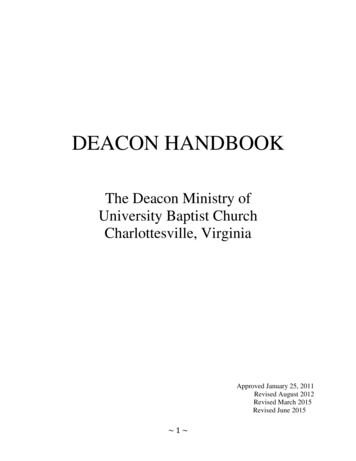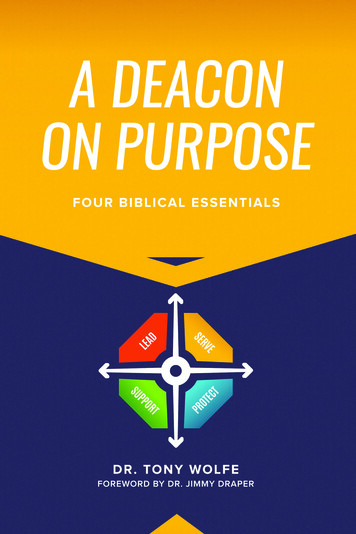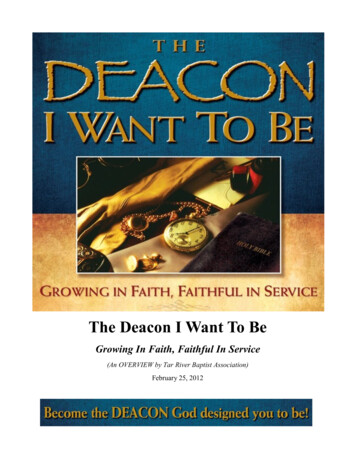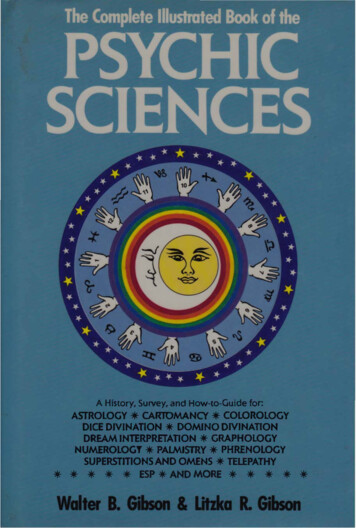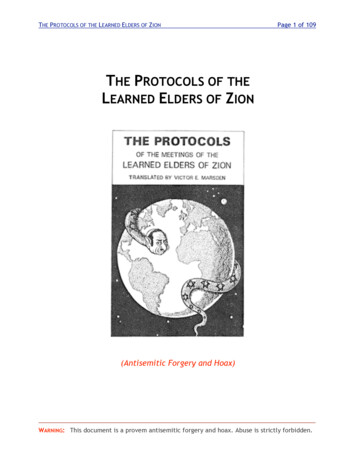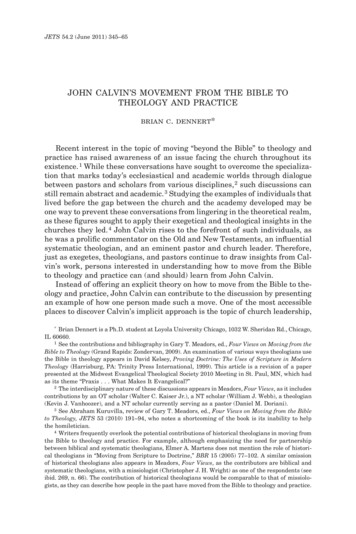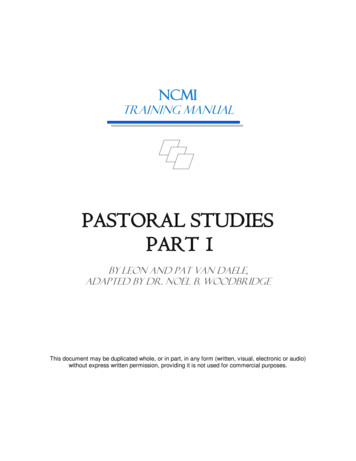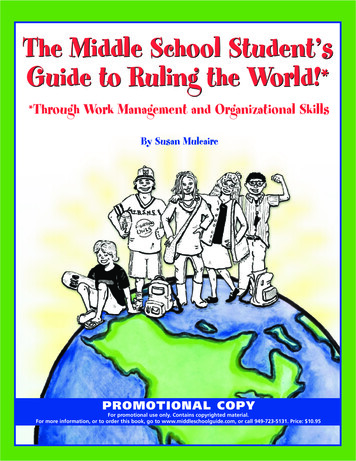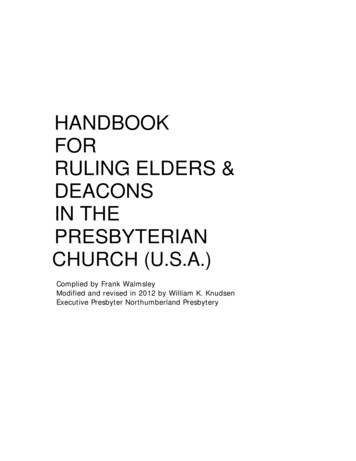
Transcription
HANDBOOKFORRULING ELDERS &DEACONSIN THEPRESBYTERIANCHURCH (U.S.A.)Complied by Frank WalmsleyModified and revised in 2012 by William K. KnudsenExecutive Presbyter Northumberland Presbytery
TABLE OF CONTENTSPRE-TEST FOR RULING ELDERS AND DEACONS1Handbook for Ruling and Teaching EldersOverviewRelationshipsChurch Government223Commissioning, Certification, OrdinationMeaning of Membership and OrdinationMembershipOrdinationThe Foundations of Presbyterian PolityThe Mission of the Church of Jesus ChristThe Mission of the Presbyterian ChurchResponsibilities of Teaching and Ruling Elders, Sessions, CongregationsRuling EldersTeaching EldersThe SessionMeetingsTypical AgendaMembership RollsSession Organization—Manual of OperationsAbsences / Decisions / and ActionsRequired Session ActionsSpecial Actions: members, communion, baptism, examining elders and deacons electThe CongregationCongregational Meetings—Called and AnnualGeneral InformationSample AgendaGeneral Provisions for Ruling Elders and Deacons—G-2.04The Ordination and Installation Covenant for Ruling Elders and DeaconsStandard Code of Ethics for Church OfficersHandbook for DeaconsPre-Test AnswersAppendix A—Suggested Manual of OperationsAppendix B— Parliamentary ProcedureAppendix C— What Does It Mean to be OrdainedAppendix D— The Awesome Task of EldersAppendix D— Can Do 3638
Pre-Class Test on your knowledge of Church Polity for Ruling Elders and Deacons1. What are the two books that make up the constitution of the Presbyterian Church USAcircle the correct books: [Answer Preface]a. The Bibleb. The Book of Confessionsc. The Book of Common Worshipd. The Book of Order2. Please list at least three essential tenets of the reformed faith: [Answer F-2.05]1.2.3.3. What are the four councils (governing bodies) of the Presbyterian Church? [F-3.0203]1.2.3.4.4. True or False: Deacons are ordained to office not to function [G-2.0104]5. True or False: Only the session can authorize the Lord’s Supper [W-2.4012]6. True or False: Congregations are required to have a Board of Deacons [G-2.0202]7. True or False: The Clerk of Session must be an active ruling elder. [G-3.0104]8. True or False: The pastor has both voice and vote in a congregational meeting. [G1.0501]9. True or false: the congregation approves the annual budget of the church including thebudget for the Board of Deacons10. True of false: The Membership Rolls of the church include Active, Baptized, andAffiliate members.11. True of false: the pastor has direct oversight of the worship of the congregation.[W-1.4004e]12. True or false: The Marks of the Reformed church: we are one, holy, catholic, andapostolic. [F-1.0302]13. True or false: The session must prepare and examine ruling elders-elect and deaconselect prior to their ordination and installation. [G-2.0402]HANDBOOK FOR RULING ELDERS AND DEACONS1
INTRODUCTION AND OVERVIEWThis document is primarily an enumeration of the responsibilities of elders (Teaching andRuling) and deacons placed in the context of policies and procedures. This is about howPresbyterians do things decently and in order, as we are often reminded. It is easy to getinvolved in the business of the church and forget to stop and think about the reasonsbehind our involvement. We are children of God and committed to doing the work of God.Our thoughts should not stray from the Word of God. Our actions need to be founded on asound theological basis, and rooted in the Love of God.The Constitution of the Presbyterian ChurchThe Constitution of the Presbyterian Church is composed of two books. The Book ofConfessions and the Book of Order.The Book of Order is divided into four sections:1. The Foundations of Presbyterian Polity2. The Form of Government3. Directory of Worship4. Rules of DisciplineRelationshipsHowever, the real place to start is with the Bible, which is our reference for faith andpractice, and one place to start is to consider the question, 'What does God require ofme?" rather than "What does my local church, or the Presbyterian Church (U.S.A.) requireof me?" The Bible asks this question in two places and gives two complementary answers.Deuteronomy 10:12 gives as the answer: only to fear the Lord your God, - to walk in all hisways, - to love him, .to serve the Lord your God with all your heart and with all your soul,and to keep the commandments.Later in the history of Israel, social issues had emerged and Micah 6:8 gives as the answer:- to do justice, - to love kindness, to walk humbly with your God.These passages remind us that our first responsibilities are to God. Then we must considerour interaction with our fellow human beings, showing them justice, kindness, and love. Elders(presbyters) and deacons are the servant leaders of the congregation and this means, not only tolead in financial and governing matters, but also to lead in matters of love and kindness andjustice. Just as we stop to think about the wisdom of spending money for a project, weneed to stop and think how we interact with our fellow church members, our family, ourfellow workers, those we know casually, and others whom we do not know but come incontact with. Consider an example. The Mission of the Church of Jesus Christ, as given in theBook of Order, includes a section that states, "The Church demonstrates the new reality inChrist by the love of its members for one another"' As members of the Church, we are calledto demonstrate this love. As elders and deacons, we are called to be leaders in demonstratingthis love. We are representatives first of God and then of our local church.HANDBOOK FOR RULING ELDERS AND DEACONS2
Church GovernmentThe polity (the form of government) of the Presbyterian Church (U.S.A.) is unique among thevarious polities of other denominations. Within a particular congregation, the pastor is justone among many serving on the local Council (governing body) called the session. The nexthigher Council is the presbytery, which generally encompasses a limited geographical areawith an average of about 66 churches. The presbytery that we belong to is the (Presbytery ofNorthumberland) with forty-four congregations and around 5,000 members.The representatives or commissioners to the presbytery include Teaching Elders (Ministers ofWord and Sacrament) generally within its borders that are members (clergy are not members ofthe local churches) and an equal number of Ruling Elders representing the churches. The nextCouncil (higher governing body) is the synod, our presbytery is located within the bounds of(The Synod of the Trinity) which encompasses a larger geographical area (all of Pennsylvania,West Virginia, and the Eastern Section of Ohio). There are sixteen synods in the United States.Again, there is equal representation between Teaching Elders and Ruling Elders. The highestCouncil (governing body) is the General Assembly, which again is composed of equal numbersof Teaching and Ruling Elders who are elected by the 173 presbyteries and meets every otheryear.Each Council (governing body) from the session through the General Assembly has responsibilities.In general, above the local level the Councils (governing bodies) are charged with accomplishingthings that apply to its region that the next lower Council (governing body) is not able to do. Forexample, the presbytery is to develop programs and provide resources to the congregations that areunder its care. The unique aspect of this polity is the significant representation of laypersons in theCouncils (governing bodies) above the local level emphasizing the “Priesthood of All Believers”. 1Peter 2:5Commissioning, Certification, and OrdinationThe Presbyterian Church recognizes the biblical principle that we each have different talents or gifts, asgiven in I Corinthians 12:4-31, and we should utilize the talents we have. During worship or otherservices, individuals (usually as part of a group) are commissioned 1 for special work such as Sundayschool teacher through a service of dedication. The Book of Order calls this "commissioning for specificacts of discipleship". The Church recognizes persons in Christian education with skills and training bothin the Bible and in education by the process of certification 2. Persons elected to be presbyters(Teaching and Ruling Elders) and deacons are set apart through an act called ordination. 3 Theordination is carried out with prayer and with the laying on of hands and focuses on Christ and the joyand responsibility of serving him through the mission and ministry of the Church. Teaching Elders(clergy) are ordained and installed by the presbytery; Ruling Elders and Deacons are ordained andinstalled by the session.1W-4.3000G-2.11013G-2.012HANDBOOK FOR RULING ELDERS AND DEACONS3
The officers of the church are chosen to fulfill particular functions. 4 This does not diminish theimportance of the commitment of all members to the ministry of the church (see again 1 Cor. 12:4-31).Ordained officers differ from other members in function only. This is illustrated each timecommunion is celebrated in the Presbyterian Church (U.S.A.): the ruling elders and deaconsserve the members, then they serve the Teaching Elder (clergy), and then Teaching Elder servesthe Ruling Elders and Deacons. This also illustrates the standard shown by Jesus in hisministry, as he came "not to be served but to serve."The importance and equality of all presbyters is demonstrated above the local level by therequirement that all councils (governing bodies) be composed of 50% Teaching Elders and50% Ruling Elders. This is extended to committees and commissions of those councils(governing bodies), as well as the bodies themselves.Meaning of Membership and OrdinationMembershipWe must begin by confessing our faith in Jesus Christ. Our baptism and public professionof faith are signs that we are Christians. The Book of Order lists ways in which Christians arecalled to be involved in the ministry of the Church. 5 proclaiming the good news. taking part in the common life and worship of a particular church. praying and studying Scripture and the faith of the Christian church. supporting the work of the Church through giving of money, time, and talents. participating in the governing responsibilities of the Church. demonstrating a new quality of life within and through the Church. responding to God's activity in the world through service to others. living responsibly in all relationships of life. working for peace, justice, freedom, and human fulfillment.Members may be unable to be fully involved in all these ways but, within our own abilities,we should strive to increase our participation and to make it more meaningful.OrdinationOrdination is the act by which the Church sets apart persons to special specified offices; inthe case under consideration here, the office is that of Ruling Elder and Deacon. Prior toordination, the persons elected to the office of Ruling Elder and Deacon must undergo aperiod of study and preparation. 6 This includes gaining knowledge of the doctrine,government, and discipline contained in the Constitution of the Church (The Book of Order ispart of the constitution) and of the duties of the office.4G-2.0104G-1.03046G-2.04025HANDBOOK FOR RULING ELDERS AND DEACONS4
They must also be examined by the Session to certify that the period of study andpreparation has7been completed and to inquire into their faithfulness in fulfilling theirresponsibilities.The service of ordination and installation 8 is to focus on the joy and responsibility ofserving Christ through the mission of the church.During the service, the newly elected elders are asked to promise or make a covenant:1. to affirm their faith;2. to attest to Scriptures;3. to be led by the Confessions of the Church;4. to fulfill the office of Ruling Elder or Deacon;5. to be governed by the church's polity (form of government);6. to follow Jesus and love our neighbors;7. to further the peace, unity, and purity of the church;8. to serve the people of the congregation with imagination and love;9. to be a faithful Ruling Elder or Deacon.A part of this service is the laying on of hands which some versions of the New Testamentuse as a synonym for ordination (see I Timothy 5:22).There are some parts of these ordination questions that could be looked at more closely. Thequestion about fulfillment of the office bothers some people. They might question theirworthiness or their ability. We should look to Scripture and read about Moses and aboutPeter. Both felt inadequate for the job and Peter even made public denials of his relationshipwith Jesus. But God used them and their abilities to do wonderful things. We need to trustGod. The question about serving the people implies your willingness to be a servant-leader.Jesus set an example that we are to follow when he took a towel and washed the feet of thedisciples (John 13:1-10). To be a Ruling Elder or Deacon you need to have a humble spirit inwhich God can use you to be God’s voice and God’s hands in providing the spiritualleadership necessary to build the Kingdom of God here on earth.The Mission of the ChurchWe must look at the mission of the church in order to understand what is required of RulingElders, Deacons and of Sessions. Reading mission statements seems, at times, to be lessonsin futility because they tend to be couched in such general terms. However, it is possible tomove from the general to the specific and we will attempt to do that. The mission statementthat follows about the Church of Jesus Christ is paraphrased and summarized from the Bookof Order. Although it is taken from the Presbyterian Church (U.S.A.) Constitution, it seems toexpress the mission of the universal church.78G-2.0402W-4.4000HANDBOOK FOR RULING ELDERS AND DEACONS5
The Mission of God—F-1.01The good news of the Gospel is that the triune God—Father, Son, and Holy Spirit—creates, redeems, sustains, rules, and transforms all things and all people. This one livingGod, the Scriptures say, liberated the people of Israel from oppression and covenantedto be their God. By the power of the Spirit, this one living God is incarnate in JesusChrist, who came to live in the world, die for the world, and be raised again to new life.The Gospel of Jesus Christ announces the nearness of God’s kingdom, bringing goodnews to all who are impoverished, sight to all who are blind, freedom to all who areoppressed, and proclaiming the Lord’s favor upon all creation. The mission of God inChrist gives shape and substance to the life and work of the Church. In Christ, theChurch participates in God’s mission for the transformation of creation and humanity byproclaiming to all people the good news of God’s love, offering to all people the grace ofGod at font and table, and calling all people to discipleship in Christ. Human beingshave no higher goal in life than to glorify and enjoy God now and forever, living incovenant fellowship with God and participating in God’s mission.The Mission of Your Presbyterian ChurchThe mission of your Presbyterian Church is to be determined by your session. It isimportant to ask your pastor and other members of the session to review with youthe mission or vision statement for your congregation. These two statements shouldbe complementary. The mission of the local church should encompass the mission ofthe whole Church but can emphasize one or more aspects of that mission. Look atyour church's mission statement and compare it to these statements. Does itemphasize what you believe to be important to your Session and to your church inyour local context and culture?Responsibilities of Teaching and Ruling Elders, Session, and CongregationRuling Elders as members of the Session—G-2.03 and 3.02The Book of Order outlines the duties of Ruling Elders both individually and jointly as theSession.Generally, Ruling Elders together with the pastor (Teaching Elder) are to strengthen andnurture the faith and life of the congregation through their leadership and service. Encourage the people in the worship and service of God. Equip and renew the people for their tasks within the Church. Equip and renew the people for their mission in the world. Visit, comfort, and care for the people with special attention to the sick and thelonely and to those who are oppressed. Inform the Session and the Pastor of those who may need special attention. Cultivate the ability to teach the Bible.All Christians have duties they are bound to perform by the law of love. These areespecially incumbent upon ruling elders because of their calling to the office.HANDBOOK FOR RULING ELDERS AND DEACONS6
In addition, Ruling Elders are to: Exercise leadership. Have responsibility for both the particular church, which they serve, and the Church atlarge. Serve faithfully as a member of the Session. Serve as commissioner to higher governing bodies when so elected. In addition, Ruling Elders and Deacons are to be persons of faith, dedication, and goodjudgment.While members of the church have a great deal of freedom of conscience, officers of thechurch must adhere to the essentials of the Reformed faith and polity 9.Suggested Essentials of the Reformed Faith (not inclusive) 10 The Mystery of the Trinity (Catholic)The Mystery of the Incarnation of the Word of God— Jesus (Catholic)Justification by Grace through Faith (Protestant)The Authority of the Scriptures (Protestant)The Sovereignty of God (Reformed)The Election of God's People (Reformed)The Covenant Life of the Church (Reformed)Stewardship of God's Creation (Reformed)Total Depravity (Reformed)Obedience to God's Word directs us to work for Justice and thetransformation of society (Reformed)In becoming a candidate or officer of the Presbyterian Church (U.S.A.), the exercise offreedom of conscience is placed under limitations. The officer is captive to the Word ofGod as interpreted in the standards of the church. 11The Teacher Elder (Ministers of Word and Sacrament)—G-2.05Teaching Elders (Ministers of the Word and Sacrament) who are called to be pastorsare responsible for: Studying, teaching, and preaching the Word.Administering Baptism and the Lord's Supper.Praying with and for the congregation.Encouraging the people in the worship and service of God.Equipping and enabling the people for their tasks within the church and their mission to theworld.Exercising pastoral care, devoting special attention to the poor, the sick, the troubled andthe dying.Participating in governing responsibilities including leadership of the congregation inimplementing the principles of participation and inclusiveness in the decision making of thechurch, and its task of reaching out in concern and service to the life of the human communityas a whole.Sharing in the ministry of the church in the governing bodies above the session.9G-2.0105F-2.01-2.0511F-3.010110HANDBOOK FOR RULING ELDERS AND DEACONS7
The Teaching Elder as pastor has responsibilities with respect to the worship of the peoplethat are not subject to the authority of the session or the congregation. 12 The selection of Scripture to be read and its translation.The preaching of the sermon or the exposition of the Word.The prayers to be offered.The music to be sung.The use of drama, dance, and other art forms.The Session—G-3.02The Session is the Council for the congregation. It shall be composed of those persons elected by thecongregation to active service as Ruling Elders, together with all installed pastors and associate pastors.All members of the Session are entitled to vote. The pastor shall be the moderator of the Session, andthe Session shall not meet without the pastor or designated moderator. If there is no installed pastor, orif the installed pastor is unable to invite another moderator, the presbytery shall make provisions for amoderator. Presbyteries shall provide by rule for moderators when the session is without a moderatorfor reasons of vacancy or inconvenience.The Session is responsible (through the Clerk) to keep accurate minutes and membership rolls. TheSession elects a clerk for a specified period of time, such as one year as determined by the session.The clerk must be a Ruling Elder but does not need to be an active member of session. In theabsence of the clerk at a meeting of the session, one of the session members is elected to beacting clerk for that meeting. 13The Session as a council of the church is responsible for the mission and government of the particularchurch and has the responsibility and power, as summarized here, to: receive members into the church lead the congregation in participation in the mission of the church provide for the worship of the people of God including preaching and the sharing of theSacraments provide for the spiritual growth of its members develop and supervise the educational program lead the congregation in ministries of personal and social healing challenge the people of God in stewardship of money and time establish the annual budget and other special offerings lead the congregation continually to discover God's working in the world instruct, examine, ordain, install, and welcome new elders (and deacons, where applicable) supervise the board of deacons (where applicable) and all other organizations withinthe congregation provide for the administration of the church's program provide for the management of the church's property maintain regular and continuing relationships with higher governing bodies establish and maintain all necessary ecumenical relationships serve in judicial matters in accordance with the Rules of Discipline keep an accurate roll of members1213W-1.4005G-3.0104 and 3.0204HANDBOOK FOR RULING ELDERS AND DEACONS8
MEETINGS—G-3.0105 and G-3.0203Regular meetings of the Session are called stated meetings. A Session is required to have atleast four stated meetings (once each quarter). Special meetings, or called meetings, can beheld upon request of the pastor (the moderator) or in writing by two members of theSession. Reasonable notice of all special meetings must be given when other than routinebusiness is to be transacted 14. The most common agenda for these meetings is to receivenew members.Meetings of councils shall be opened and closed with prayer. Meetings shall beconducted in accordance with the most recent edition of Robert’s Rules of Order NewlyRevised, except when it is in contradiction to this Constitution. Councils may also makeuse of processes of discernment in their deliberations prior to a vote as agreed upon bythe body. 15Typical Session Agenda1. There may also be a brief devotional, Scripture reading, or time of sharing.2. The roll is taken and a quorum declared.3. Session is then asked to approve granting excused absences to those elders whohave requested them.4. Minutes of previous session meetings are approved as well as minutes of anycongregational meetings (unless previously approved by the congregation).5. For stated meetings, the agenda must be approved; changes can be made in theagenda, by Session vote, at any time during the meeting. For called meetings, thepurpose of the meeting must be declared and that is the agenda.6. The Pastor's Report is received and action taken on items in the report, asappropriate.7. The Clerk's Report is received. Action is taken on recommended items, asappropriate.8. Committee or Ministry Team Reports are received. Committees should beencouraged to have written reports submitted in advance and items that requireSession action should be clearly marked. Committee or Ministry Team Chairpersonsshould not read their reports; it should be assumed that each Ruling Elder has readthe report and is familiar with its contents.9. Old and New Business. Any items not previously considered may be brought beforethe Session at this time. Ruling Elders are encouraged to bring up only items of apressing nature. Other issues should be submitted to the appropriate Committee orMinistry Team for due consideration before being brought to Session.10. Closing: Session meetings are closed with prayer.1415G-3.0203G-3.0105HANDBOOK FOR RULING ELDERS AND DEACONS9
MEMBERSHIP ROLLS—G-3.0204aThere shall be three rolls of members1. Baptized: Those who have not professed their Faith in Christ publically.2. Active: Those who have professed their Faith in Christ Publically.3. Affiliate: Those whose membership are in another church.If a Session determines it is important to maintain a register for inactive members it istheir option with the understanding that the names on the inactive register are nolonger considered to be members of the congregation and in order to be restored toactive membership they must be received into the life of the congregation by a reaffirmation of their faith. 16Session OrganizationThe sessions of different churches can have different ways of organizing themselves. SomeSessions have moved to Ministry Teams rather than Committees. Each church adapts its ownstructure or no-structure to suit its own needs and available resources. The only committeerequired by the Book of Order is a Nominating Committee. 17If a Session determines that Committees or Ministry Teams are needed they will be organizedby an action of the Session to enhance the mission of the church. Different churches organizethemselves in different ways; no one way is the best for everyone. In most, but not all,churches, each of the Standing Committees or Ministry Teams will have an active Ruling Elderas the chairperson and usually one or more active Ruling Eelders serving on the committee orteam. In addition, each Committee or Ministry Team can recruit other church members orfriends to serve as the Holy Spirit gifts them.Each Committee or Ministry Team carries out the business related to its area of responsibilityand oversees its budgeted line items. Committees or Ministry Teams should report to theSession as directed by the Session and seek permission for items not specified in their budget oragreed upon responsibilities.Every Session will create a Manual of Operations that should include the following: 181. The Articles of Incorporation2. Church Bylaws3. Standing Rules or Church Policies: i.e. personnel (including job descriptions), weddings,funerals, memorials, property use, etc.4. Sexual Misconduct Policy for Staff and Volunteers5. See Appendix A for a sample of a Manual of OperationsA copy of the Manual of Operations should be kept in the office and be made available toanyone who wants to see it.16G-3.0204bG-3.011118G-3.010617HANDBOOK FOR RULING ELDERS AND DEACONS10
Responsibilities of Being a Good Ruling Elder Absences. If you need to be absent from a stated Session meeting, notify the pastor,the Clerk of Session, or the church office, you will be given an "excused absence”.Note: Sessions can make a rule or policy that if a Ruling Elder has more than three ormore unexcused absences that Ruling Elder will be counseled by his or her peers andbe requested to step down for a lack of commitment if their absences continue. Decisions and Actions. It sometimes takes a while after a new class of ruling elders joinsthe session for the group to learn how best to work together. We are all working towardthe same goals so our discussions should take place in an atmosphere of Christian loveand respect. We will not always agree but we all have agreed to abide by the church'spolity which is that we abide by the majority's vote. Sometimes we need to agree todisagree. 19Required Session ActionsThe Book of Order is written so that a Council’s actions can be done decently and in order.The intent is to ensure that the church's government functions fairly and efficiently withcareful consideration being given to all issues and that biblical principles are followed.In this Book of Order(1) SHALL and IS TO BE/ARE TO BE signify practice that is mandated,(2) SHOULD signifies practice that is strongly recommended,(3) IS APPROPRIATE signifies practice that is commended as suitable,(4) MAY signifies practice that is permissible but not required.(5) ADVISORY HANDBOOK signifies a handbook produced by agencies of theGeneral Assembly to guide synods and presbyteries in procedures related to theoversight of ministry. Such handbooks suggest procedures that are commended,but not required. 20Some Special CasesThere are times when it is the duty of Session to see that all requirements of the Book of Orderare met. This is sometimes difficult because the requirements may be distributed in variousplaces. There are four important examples.1. Receiving New Members. Members are received into a congregation by Sessionaction. Session may not deny membership to anyone if the basic conditions are met,namely profession of faith in Christ. This condition can be met by actual profession offaith, by reaffirmation of faith, or by letter of transfer from another Christian church. Itis assumed that a person who is a member of another Christian church has previouslymade a profession of faith. The procedure by which a new member is receivedincludes welcoming and recognizing that person during a service of worship. 2119F-3.0205Preface to the Book of Order21G-1.0301-G-1.0303 and F-3.0102 Corporate Judgment; W-4.2000—services of welcome and reception20HANDBOOK FOR RULING ELDERS AND DEACONS11
2. The Lord's Supper. The Session is given the responsibility to authorize the Lord's Supperat appropriate times. This appears to mean that the Session must take theresponsibility to see that all conditions are met. While there is a lower limit to thenumber of times in a year (once per quarter) the Lord's Supper is to be observed, thereis no upper limit other than what is reasonable. The responsibility of the Session is tosee that this sacrament is observed and is observed in an appropriate atmosphere andsetting. Other requirements include the following. The bread and cup may be served bythose in the ordered ministry of the church, or b
Jun 01, 2013 · The Church recognizes persons in Christian education with skills and training both in the Bible and in education by the process of . certification. 2. Persons elected to be presbyters (Teaching and Ruling Elders) and deacons
